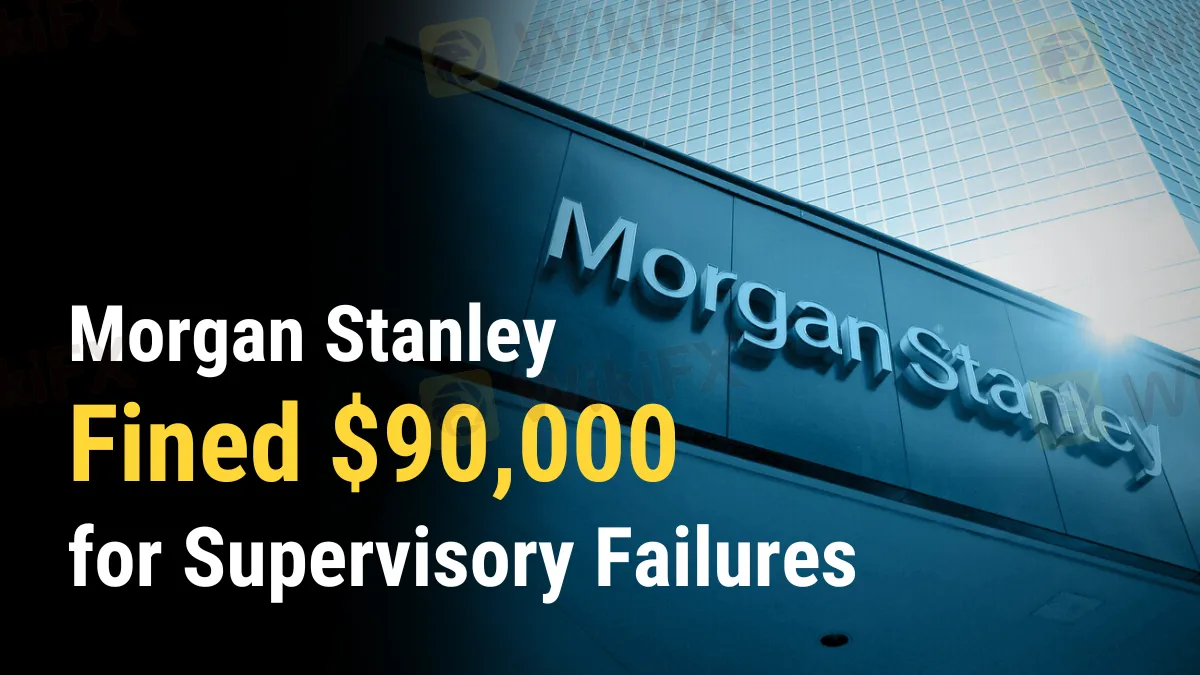简体中文
繁體中文
English
Pусский
日本語
ภาษาไทย
Tiếng Việt
Bahasa Indonesia
Español
हिन्दी
Filippiiniläinen
Français
Deutsch
Português
Türkçe
한국어
العربية
Morgan Stanley Fined $90,000 for Supervisory Failures
Abstract:Morgan Stanley was fined $90,000 for failing to supervise employee trading activities on NEX SEF, underscoring the importance of robust oversight in financial markets.

On April 17, 2024, the NEX SEF punished Morgan Stanley for its inability to effectively oversee a worker's trading actions on the platform from January to May 2021. The results showed that to move positions across his controlled Morgan Stanley accounts, the trader made self-matched transactions on the NEX SEF. The non-deliverable forward instruments traded in these deals were the Indian Rupee, Indonesian Rupiah, Korean Won, Malaysian Ringgit, and Taiwan Dollar.
Although Morgan Stanley received a warning from the NEX SEF on the dubious activity, its control and monitoring procedures proved to be inadequate in detecting and halting the ongoing self-matching transactions. The Panel concluded that the participant's failure to monitor the behavior of their employees and agents on the platform infringed under NEX SEF (legacy) Rule 407(h).
Morgan Stanley did not acknowledge or refute the factual findings or rule breaches in response to the disciplinary action. Nevertheless, they agreed to a settlement that included a monetary penalty of $90,000. This penalty serves as a poignant reminder of the paramount need for robust supervision and compliance protocols inside financial institutions.

The instance highlights how difficult it is for regulatory agencies to maintain market integrity and stop wrongdoing, especially when it comes to computerized trading. The intricate dynamics of financial markets require constant attention to detail from companies to prevent security lapses and preserve investor trust.
Other market players should take note of this disciplinary action against Morgan Stanley, which emphasizes the serious consequences of inadequate supervision. To identify and stop fraudulent activity and ultimately protect the integrity and stability of the financial markets, it highlights the vital role that efficient monitoring and surveillance systems play.
Investment in strong compliance infrastructure and training programs must be given top priority by financial institutions as regulatory scrutiny increases and technology continues to change trading practices. Mitigating operational risks and guaranteeing regulatory compliance need proactive steps to improve oversight and monitoring capabilities.
Finally, the financial sector should take note of Morgan Stanley's disciplinary action as a reminder of the need for strict oversight and compliance with legal requirements. Through the process of assiduously analyzing these occurrences, market players will be able to preserve the integrity of the world's financial markets and promote a transparent and accountable culture.

Disclaimer:
The views in this article only represent the author's personal views, and do not constitute investment advice on this platform. This platform does not guarantee the accuracy, completeness and timeliness of the information in the article, and will not be liable for any loss caused by the use of or reliance on the information in the article.
Read more

Top 10 Trading Indicators Every Forex Trader Should Know
Master the top 10 Forex trading indicators to analyze real-time Forex quotes, trends, and market signals. Learn strategies to boost accuracy and avoid mistakes.

WikiEXPO Global Expert Interview: Simone Martin—— Exploring Financial Regulation Change
In the midst of financial innovation and regulation, WikiGlobal, the organizer of WikiEXPO, stays abreast of industry trends and conducts a series of insightful and distinctive interviews on pivotal topics. We are delighted to have the privilege of inviting Simone Martin for an in-depth conversation this time.

MultiBank Group Wins Big at Traders Fair Hong Kong 2024
Discover how MultiBank Group, a global leader in financial derivatives, secured three prestigious awards at Traders Fair Hong Kong 2024, highlighting its innovative trading solutions and industry excellence.

CySEC Settles Compliance Case with Fxview Operator Charlgate Ltd
Discover how CySEC resolved compliance issues with Charlgate Ltd, the operator of Fxview, through a €50,000 settlement. Explore the investigation, regulatory measures, and CySEC's new website designed for improved accessibility and transparency.
WikiFX Broker
Latest News
Geopolitical Events: What They Are & Their Impact?
Volkswagen agrees deal to avoid Germany plant closures
Top 10 Trading Indicators Every Forex Trader Should Know
WikiEXPO Global Expert Interview: Simone Martin—— Exploring Financial Regulation Change
TradingView Launches Liquidity Analysis Tool DEX Screener
MultiBank Group Wins Big at Traders Fair Hong Kong 2024
'Young investors make investment decisions impulsively to keep up with current trends' FCA Reveals
Why Do You Feel Scared During Trade Execution?
CySEC Settles Compliance Case with Fxview Operator Charlgate Ltd
Malaysian Influencer Detained in Taiwan Over Alleged Role in Fraud Scheme
Currency Calculator


